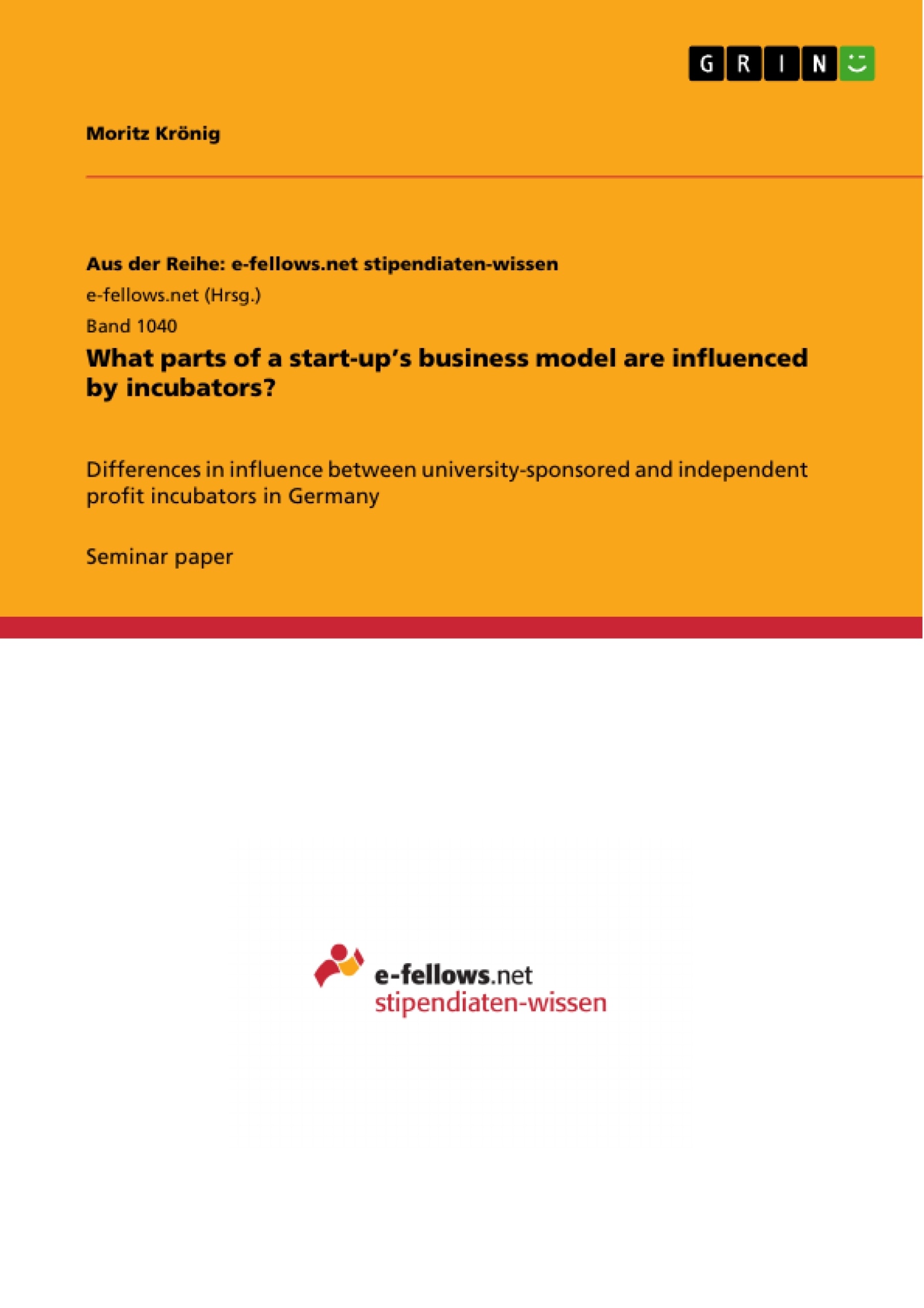Incubators and their influence on start-ups as well as their performance are widely discussed, especially in Germany where Berlin and Munich are developing a very supportive environment for start-ups. There is a variety of different types of incubators and offered services. Some work for-profit others work non-profit and receive governmental support. For a start-up, the decision, which incubator to chose (or apply for a development program) depends on its business model and the parts of it that need further adjustment. Does a start-up for example need capital? Does it require a lab to conduct experiments? Does it need entrepreneurial education? All those questions influence the decision for the right incubator type.
There has been some research done compiling the services offered by incubators in general (Aerts, Matthyssens, & Vandenbempt, 2007; Al-Mubaraki & Busler, 2010; European Commission Enterprise Directorate-General, 2002; Rice, 2002; Sang Suk & Osteryoung, 2004). In a first step I want to map the different services offered by incubators to the parts of a start-up’s business model to generate an overview of what parts of a business model are influenced in general. There has also been some research about the services offered by different types of incubators (Mian, 1994, 1996) and there has been research comparing different types of incubators (Gassmann & Becker, 2006; Grimaldi & Grandi, 2005; von Zedtwitz & Grimaldi, 2006), but there is almost no literature comparing the influence on a start-up’s business model of different types of incubators. In this work I want to reveal differences in influence on a start-up’s business model in Germany between university-sponsored incubators and independent incubators, as they are the most distinguishable types of incubators. University-sponsored incubators mostly belong to governmental institution and are non-profit oriented, whereas independent (private) incubators do not belong to any institution and aim to make a profit. This work should help distinguish university-sponsored and independent incubators regarding their influence on a business model. First I want to compile the results of existing literature and in a second step challenge those results with qualitative interviews. Therefore I conducted interviews with one university-sponsored and one independent incubator. Providing a clear view on the differences in influence can help start-ups decide which incubator type to chose.
Inhaltsverzeichnis (Table of Contents)
- Introduction
- Incubator Theory
- Incubator typology
- Methodology
- Incubator influence on a business model
- Existing literature University vs. independent incubators
- Influence on a start-ups business model: University-sponsored vs. independent incubators
- Conclusions and further research
Zielsetzung und Themenschwerpunkte (Objectives and Key Themes)
This seminar paper examines the influence of incubators on different parts of a start-up's business model, particularly focusing on the distinctions between university-sponsored and independent profit incubators in Germany. The paper aims to clarify how these incubator types impact business model elements and provide insights to help start-ups choose the most suitable incubator type for their needs.
- The influence of incubators on start-up business models
- Differences in influence between university-sponsored and independent incubators
- The impact of incubator services on specific business model elements
- The role of university-sponsored incubators in supporting start-ups
- The role of independent incubators in the start-up ecosystem
Zusammenfassung der Kapitel (Chapter Summaries)
- Introduction: This chapter introduces the topic of incubators and their influence on start-ups, particularly in the German context. It highlights the diverse range of incubator types and services available, emphasizing the importance of choosing the right incubator for a start-up's specific needs.
- Incubator Theory: This chapter provides a theoretical framework for understanding incubators. It delves into the typology of incubators, outlining different categories and their respective characteristics. The chapter also explores the methodology used to study incubator influence on business models and examines existing literature on the comparison between university-sponsored and independent incubators.
- Influence on a start-ups business model: University-sponsored vs. independent incubators: This chapter focuses on the core research question of the paper, analyzing the differences in influence between university-sponsored and independent incubators on start-up business models. It examines how various incubator services impact different aspects of a business model and provides insights into the specific advantages and disadvantages of each incubator type.
Schlüsselwörter (Keywords)
The main keywords and focus topics of this paper include: start-up incubators, business model, university-sponsored incubators, independent incubators, Germany, incubator influence, business model elements, start-up support, incubator services, entrepreneurial ecosystem.
Frequently Asked Questions
How do incubators influence a start-up's business model?
Incubators influence business models by providing services like capital, laboratory access, and entrepreneurial education, which help start-ups adjust their strategy and operations.
What is the difference between university-sponsored and independent incubators?
University-sponsored incubators are usually non-profit and government-supported, while independent incubators are private, for-profit entities without institutional affiliation.
Why is the choice of incubator important for a start-up?
The right choice depends on the specific needs of the start-up's business model, such as whether they require technical infrastructure or financial investment.
What are the key themes of this research?
Key themes include incubator typology, the impact of incubator services on business model elements, and a comparison of incubator types in the German ecosystem.
Which cities in Germany are highlighted as supportive for start-ups?
Berlin and Munich are specifically mentioned as cities developing a very supportive environment for start-ups and incubators.
- Citation du texte
- Moritz Krönig (Auteur), 2014, What parts of a start-up’s business model are influenced by incubators?, Munich, GRIN Verlag, https://www.grin.com/document/284289



